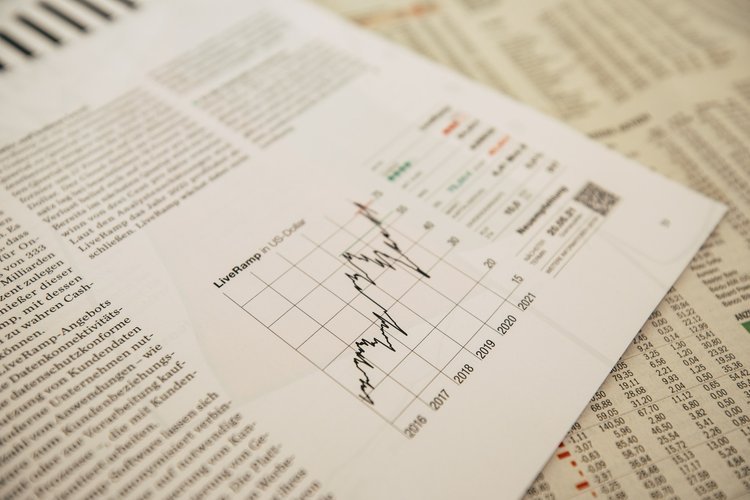EP.06/ The Link Between Sustainability And Business Performance
LISTEN NOW
EP.06/
BLOG POST:
IS BEING A TRULY SUSTAINABLE BUSINESS ACTUALLY PROFITABLE? LET’S FIND OUT.
In this article, we'll explore the link between sustainability and business performance and expand on statistics, research and real-life examples where companies that prioritize profits with purpose have built successful and maintainable models that outperformed their competition. We’ll discuss the connection between the real issues in the fashion industry that typically take an activist lens, and explain how acting on these issues is not only “a good thing to do” but is also essential for the future success of the industry and our individual businesses.
In the past few decades, we’ve seen an alarming increase in catastrophic social and environmental effects around the world: including in Ghana, Bangladesh, India, China, Taiwan and more. These human rights and environmental crises such as wage theft, forced labour, water scarcity, biodiversity loss, chemical pollution and more can all be tied back to how the fashion industry has been and continues to operate today.
And while these are major human rights and environmental justice issues that need to be addressed on a large systematic scale, they’re also issues that we as business owners need to be paying more attention to. If the environmental and social structures we rely on collapse or are left unchecked (e.i. water shortages, wage strikes, etc.) we could easily go out of business within weeks.
The problem is, it’s very easy to disassociate ourselves from issues that we are not physically present to witnesses. We pretend that this damage we have caused is not ours at all - but is just a fact of “life” in other parts of the world.
HOW CLIMATE CHANGE AFFECTS BUSINESS SUCCESS:
Let’s take one T-Shirt for example:
To make just one T-shirt you need around 2,700 litres of water; this is enough for one person to drink for 900 days - to give you a better idea of scale, that's enough water for 1 person to survive on for over 2 years.
So, not only is this excessive water usage depriving local communities of clean, potable water, but it’s also directly affecting the potential for future business success.
If we don’t care for our water supply and how we consume, restore or recycle it, how can we be so sure there will be enough water to keep our business operational within 5-10 years?
So you see, sustainable business isn't just about doing better than the rest, it's about building businesses that will last and fixing systems that have been damaged by our own industry and how we produce fashion today.
And studies have shown that true sustainability (not greenwashing) can be more profitable than keeping business as usual – but it requires people to look for new innovative ways of doing things.
So the real question is why not invest in a sustainable business?
I believe that purpose-driven business models can drive your brand to the top and is a more financially viable option if you want to succeed long-term. But it requires you to rethink the current strategies that make a business “successful”.
The current cookie-cutter approach to business goes by a simple strategy: immediate action = immediate rewards. Whereas a sustainable business strategy relies on calculated action = long-term rewards.
The challenge with this approach is that many business leaders will try to approach sustainable strategies in the same way a marketing strategy or a sales strategy is implemented. When you implement those strategies, you typically look to see results within a quarter or two. But sustainability is a little bit different and the way that you measure sustainability is also different compared to the way that you measure sales and marketing.
Although a sustainable business strategy may take a bit longer to produce results than a marketing or sales strategy, it could be the difference between your business succeeding long-term or crumbling at the site of a climate/social crisis.
But in case you find the idea of sustainability being profitable hard to believe, let’s hear some hard facts from experts from Harvard, MIT and more.
Facts & Stats:
This article is heavily based on the statistics from the Profits With Purpose: How organizing for sustainability can benefit the bottom line report which I will be quoting in brown below.
So the first thing I want to highlight is a study conducted by Deutsche Bank, which evaluated 56 academic studies and found that companies with high ratings for environmental, social, and governance (ESG) have a lower cost of debt and equity.
In fact, 89 percent of the studies they reviewed show that companies with high ESG ratings outperform the market in the medium (three to five years) and long (five to ten years) term. (p.2)
That study was conducted nearly 10 years ago. Just imagine how much that’s grown from then till now.
Additionally, The value at stake from sustainability issues can be as high as 25 to 70% of earnings, before interest taxes, depreciation and amortization are considered (p.8).
So not only is sustainability good for business but not implementing sustainable practices in your business can actually harm the future of your business.
Because how can you operate when there is a resource shortage delaying production? This isn’t that far off of a possibility - communities are experiencing water shortages and environmental catastrophes caused by our collective action right now, just check out the headlines right now about water scarcity alone. So we can’t possibly expect this not to affect us eventually.
For the fashion industry, sustainability is more than just a "nice thing to do", it also helps mitigate operational risk and ensure the future success of the industry. We need garment workers - who else is going to make our clothes? We need mills and farms - how else are our materials going to be produced?
By investing in sustainable ways to operate in these and many other sectors, we can ensure the long-term success of our industry and our business.
Take a look at this graph that shows how successful companies are pursuing sustainability in a way that creates value - and I don’t mean simply updating their “sustainability” page. These are organizational strategies that are helping businesses rise to the top.
The problem is that brands are only focusing on this part…
… Without fully implementing every aspect of sustainable business. And sooner or later, these practices will not be enough to stay afloat.
Ok, so now we’ve seen that sustainability has its place in profits and substantial growth when implemented fully.
But how much profits can this bring?
A report by the Business and Sustainable Development Commission - a subsidiary of the United Nations - indicated that if we implement and reach the UN Sustainable Development Goals we could see a potential profit opportunity of 12 trillion dollars by 2030. (p.14)
So if all the stats indicate why we should do this and that it's better for business, why aren't we doing it?
Why It’s Not Working
In reality, it’s mostly human habit, fear of change, disrupting current business models, and also the cost of the initial investment.
A lot of the time corporations or executives are cautious to implement sustainability metrics into their business models because as I mentioned earlier, sustainability goals are measured differently than marketing or sales goals.
Sustainable business models do work. They've been tried and proven by industry leaders in various different sectors, but what it costs and what most people are willing to invest in is strategic and innovative thinking.
It requires hiring people that disrupt the old way of doing things and provide insights to improve your business. And as business owners, we tend to really not like this.
Some of the thoughts that we think about when we see someone wanting to improve our business model in a way that we don't understand is “how is someone new who doesn't know anything about me or my business going to tell me I need to change everything I spent X amount of years to build” - rejected.
That's the kind of old-school mentality that drives once upon a-time industry leaders out of business.
We need sustainability to maintain business performance on a long-term scale - without it, we won’t have businesses to operate.
So my recommendation is; if you want to be a blast from the past, don't invest in sustainable business.
But if you want to take your business to the next level, where your profits mirror your values, then here are four key organizational practices that can help you get there.
WHAT YOU CAN DO:
Principles To Improve Your Business:
These practices aren’t new, in fact, they are typically associated with performance management. However, these principles work directly with how we can measure and manage sustainability goals on a material level and are a great baseline for how to develop these goals from zero.
1) Identify issues & set priorities:
Develop a clear set of priorities and start by analyzing what matters most along the entire supply chain. Ways you can do this is through internal analysis and consultations with stakeholders, including customers, regulators, and non-governmental organizations. This process should enable you to identify the sustainability issues with the greatest long-term potential and help you to create a systematic agenda, not a vague list of ideal desirables. (p.4)
For example, let’s use water scarcity in the fashion industry. This is a problem that would have a great long-term potential to address. So maybe you want to invest in R&D research that is finding out ways that you can recycle polluted water and clear it out and use it or distribute it in a clean and safe way. Or maybe you find that labour conditions stand out more, and you want to invest in suppliers that only operate ethically or invest in helping suppliers that do not operate ethically, become ethical.
Whatever it is you choose, conduct a business analysis and break it down to three to five specific goals that you can actually address.
2) Set goals:
These goals should be specific, ambitious, and measurable against an established baseline, such as GHG emissions; they should also have a long-term orientation (five years or more) and be integrated into business strategy. And their intent should be unmistakable.
For example - don’t set goals like this: “reduce the impact of our packaging on the environment” - that sounds a bit vague. Instead, set goals like this; “Switch up to 45% of all packaging to plastic-free by 2023 compared to the current status at 12%.”
That gives you a specific measurable goal on how to reduce the impact of your packaging on the environment. But it's doing it in a very specific way with specific metrics and a real deadline.
3) Make The Money Case For Sustainability:
Here’s the thing, a lot of shareholders are more worried about short-term performance than long-term growth. In fact, almost half (48%) of survey participants in the Profits With Purpose report say that the pressure of short-term earnings performance is at odds with sustainability initiatives.
A productive response to this problem is to make the business case for sustainability and to realize that sustainability can actually pay for itself - and more.
As I mentioned earlier, businesses that have implemented ESG metrics into their business models have outperformed their competition by 89%! So it’s very important that the financial benefits of sustainability are shown and communicated rigorously within your business and reinforced with fully costed financial data.
4) Create accountability:
The main reason companies fail to capture the value of sustainability is the lack of incentives to do so, whether positive or negative. According to the UN Global Compact, only 1 in 12 companies links executive remuneration to sustainability performance and only 1 in 7 rewards suppliers for good sustainability performance.
There just simply is not enough accountability in the industry to make sure that we are following through with our goals. There are a lot of investments going through right now for sustainability, but the problem is we need to see accountability.
We need to see governments, corporations and businesses set accountability models at every level of the value chain to see real change and collective impact.
Key Takeaway
To conclude, I think the facts are clear. Sustainability can only mean good for business and enrich the value you bring as a brand and increase profits. Now what we need to see is proactive action and initiative to make it happen.
What does this mean for you?
If you're a brand owner - use the information and resources in this post for good. And if you need help, feel free to reach out and we can see how we can help!
If you’d like to support us, please consider subscribing to the newsletter and following our Instagram page @naturspired for more sustainable fashion content!










